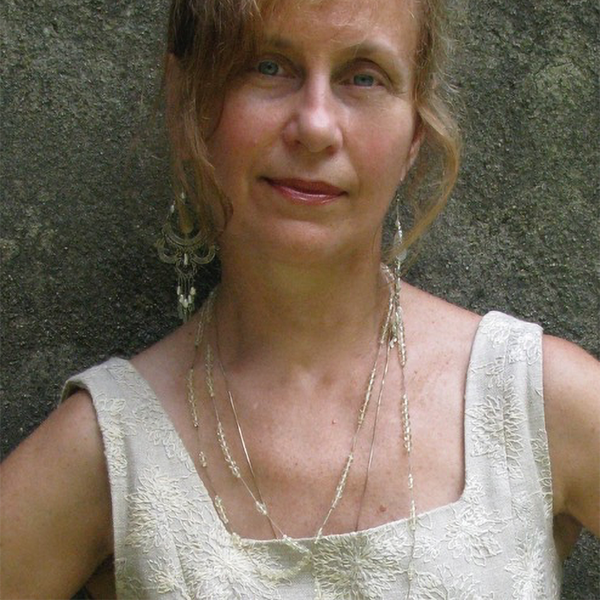Lia Purpura, Skate’s Egg Case (detail), featured in AGNI 102
from The Enchanted Desna
Trembling, tucked into myself like a small bird, I imagined Judgment Day, the icons on the wall. I cried a little. How helpless I was lying in Grandfather’s boat and how schooled of unpleasant and bad things. How unpleasant it is when Grandmother curses at me or when long rain pelts down and doesn’t want to stop. How unpleasant when a leech clings to your leg, or when strange dogs bark at you, or a goose hisses around your feet, nips at your pants with a red beak. And how unpleasant to carry with one hand a large bucket of water or to weed or tear off side-shoots of tobacco. How unpleasant when Father comes home drunk and fights with Grandfather, then with Mother, then throws plates. How unpleasant to walk barefoot over wheat stubs or to giggle in church when something strikes you as funny. Riding in a hay-filled wagon about to tip over is unpleasant. It’s unpleasant to look at a large fire, but pleasant to look at its embers. How pleasant it is to hug a foal. Or at daybreak to see your calf wandering in all by itself, to know it found its way home in the dark. How pleasant it is to wade in warm puddles after thunder or to catch a small pike with your bare hands, stir muddy water, or to watch someone slowly pull in a large net. How pleasant it is to find a bird’s nest in the grass, to eat Easter buns and eggs. How pleasant when spring waters flood the house and everyone wanders all over, how pleasant to fall asleep in Grandfather’s boat, like a mouse in grain, after harvest—rye, millet, and barley drying on the stove. And, of course, the smell of drying grain is pleasant. It’s pleasant to haul small heaps into large heaps, to walk around them, grain spilled everywhere. It’s pleasant when an apple thought sour turns out to be sweet. It’s pleasant when grandfather yawns, when bells ring out on a summer evening. It’s also pleasant—and this I loved most—when Grandfather talked with a horse or foal as if they were human. I loved when out of the darkness on the road a voice called out “Peace to you!” and Grandfather replied: “And may God grant you peace!” I loved when a big fish tossed in the lake or in the purple stillness of the Desna at sunset. I loved to lie in a wagon, returning home from the meadow, to look up at the star-filled sky. I loved to drift off to sleep—when the wagon pulled around to the house and I was carried, asleep, inside. I loved the sound of wheels screeching under wagons heavy with harvest in August. Birds chirping in the garden and in the field. I loved swallows in barns, corncrakes in meadows. I loved the splash of spring water. At twilight, the cry-croak of frogs during a rainfall in a bog. I loved the songs of girls—carols, songs of the New Year, the coming of spring, the harvest songs. I loved the thud of apples in the orchard at dusk when they fall unexpectedly into the grass. A certain mystery and sadness, the inevitability and law that out of what seemingly ends, come the pleasant things of this world. I loved thunder, although it scared Mother, the downpour and loud wind for the gifts they brought to the orchard.

Alexander Dovzhenko
Ukrainian film director Alexander Dovzhenko (1894–1956) directed over thirteen films. His more important films include Arsenal (1928), Zmelya (1930), and Aerograd (1935). His more notable prose works include his Notebooks and The Enchanted Desna, written in Ukrainian and subsequently translated and revised into Russian. (2003)

Dzvinia Orlowsky
Pushcart Prize poet, translator, a founding editor of Four Way Books, Dzvinia Orlowsky is the author of six poetry collections published by Carnegie Mellon University Press including her most recent, Bad Harvest, a 2019 Massachusetts Book Awards “Must Read” in Poetry. She is a recipient of a Massachusetts Cultural Council Poetry Grant, a Sheila Motton Book Award, a co-recipient of a 2016 National Endowment for the Arts Literature Translation Fellowship, and her first collection, A Handful of Bees, was reprinted as part of the Carnegie Mellon University Press Classic Contemporary Series. Her translation from Ukrainian of Alexander Dovzhenko’s novella The Enchanted Desna was published by House Between Water in 2006. In 2014, her co-translation with Jeff Friedman of Memorials by Polish poet Mieczyslaw Jastrun was published by Dialogos. Her poem sequence “The (Dis)enchanted Desna” was a winner of the 2019 New England Poetry Club Samuel Washington Allen Prize, selected by Robert Pinsky. More recently, her co-translations with Ali Kinsella from the Ukrainian of Natalka Bilotserkivets’ selected poems, Eccentric Days of Hope and Sorrow, (Lost Horse Press, 2021), was a finalist for the 2022 Griffin International Poetry Prize, the 2022 Derek Walcott Poetry Prize, the ALTA 2022 National Translation Award and was winner of the 2022 AAUS Translation Prize. A book of her co-translations with Ali Kinsella from the Ukrainian of Halyna Kruk’s poetry is forthcoming from Lost Horse Press in 2024. Dzvinia is a contributing poetry editor to AGNI, Solstice Literary Magazine, and she is a Writer-in-Residence at the Solstice Low-Residency MFA in Creative Writing Program. (updated 11/2022)
Orlowsky’s collection A Handful of Bees was reviewed in AGNI 42 by Mary Maxwell.
Orlowsky’s collection Edge of House was reviewed in AGNI 50 by Miriam O’Neal.
